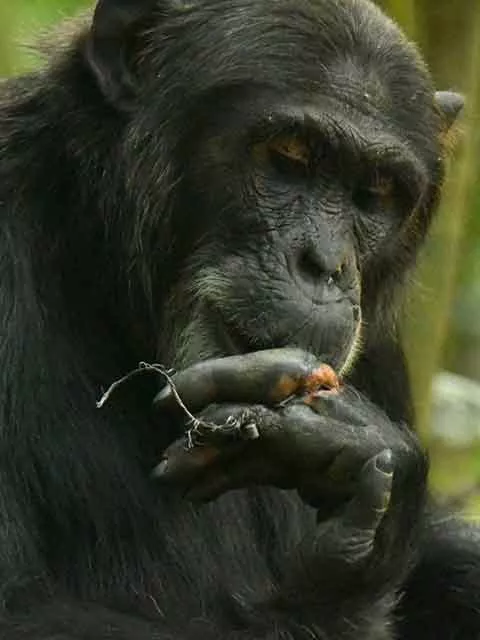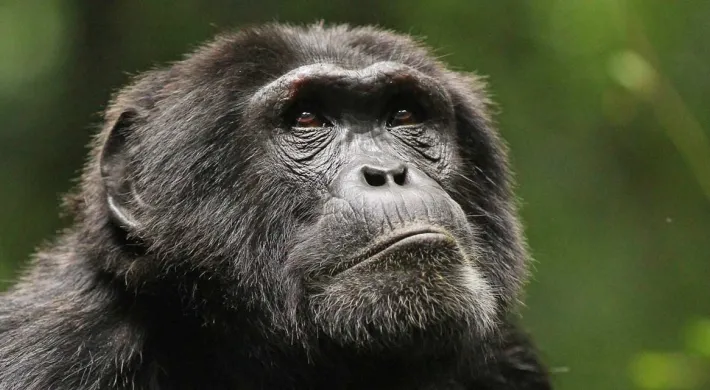Written by Samuel Angedakin, Project Manager, Ngogo Chimpanzee Project
Hunting is a significant threat to endangered apes, including chimpanzees. In Uganda, luckily, people do not traditionally hunt chimpanzees. Nevertheless, the chimpanzees of Kibale National Park are at risk of being caught in snares- wire loops designed to catch animals around the feet or neck- set for other animals by illegal hunters. As the animal struggles, the snare tightens. In an attempt to escape, many animals lose limbs. The indiscriminate nature of the traps means that chimpanzees can be caught, severely maimed, and even killed. It is estimated that 25% of chimpanzees in Uganda have injuries from being caught in snares. A booming human population on the park's periphery is putting pressure on the wildlife, including animals targeted for meat (such as antelope, pigs, and buffalo), elephants for ivory, and chimpanzees as accidental victims.

A chimp called Peterson, part of the Ngogo chimp community injured by a snare
In 2010, the Ngogo Chimpanzee Project, which has studied chimpanzees in the center of Kibale National Park for nearly 30 years, initiated a snare removal program to reduce snares being set and, as a result, decrease the number of chimpanzees and other animals being caught. In collaboration with the Uganda Wildlife Authority, we have two-person teams who locate and remove snares. Some of our staff are former poachers, who now use their skills to find and remove snares they themselves once set.
As a result of our work and that of the Uganda Wildlife Authority, the number of snares set around the Ngogo research area has drastically dropped. Our teams conduct extended patrols and spend up to ten nights camping in the forest every month. We remove hundreds of snares in a year. Additionally, the teams often thwart other attempts to catch and kill animals illegally. They regularly find pits dug to trap elephants for their ivory. These deep pits are camouflaged on animal paths so that unsuspecting animals will fall into them. When our team finds these pits, the materials used to conceal pits are removed, and the pits are filled.
The project now employs six dedicated snare teams that patrol about three-quarters of Kibale National Park, protecting chimpanzees and other wildlife, and there has been tremendous progress.
Ngogo Chimpanzee Project snare removal team members are pictured below.
In addition to being caught in snares, chimpanzees face another risk: direct conflict with people. Although the Ngogo chimpanzees live in the center of the forest, many other chimpanzee communities in Kibale National Park live at the edge. These chimpanzees will eat crops planted on the small farms of people near the park boundary. Chimpanzees, baboons, and elephants and their “crop raiding” are problems for local farmers. People can sometimes retaliate against animals, potentially killing them.
To reduce human-wildlife conflict, the Ngogo Chimpanzee Project recently initiated a program to mitigate chimpanzees foraging on peoples’ farms. We have “conflict management teams” who patrol the park boundary and the peoples’ farms to ensure the crop-raiding chimpanzees are either blocked from coming into the community or chased back to the park. This approach has proved successful in minimizing the human-chimpanzee conflict. The conflict management team also locates and removes snares set by farmers in their gardens or at the park boundary.
The North Carolina Zoo has been crucial in supporting our chimpanzee conservation efforts. The Zoo has supported our snare removal program by providing us with mobile data collection devices and laptops, as well as other sources of funding over the years. Last year, North Carolina Zoo further enhanced our capacity to manage patrols by transitioning us to Spatial Monitoring and Reporting Tool (SMART) and training our project staff on its use. Such support is so important. Primates and other wildlife continue to be threatened by poaching and illegal deforestation, which is fueled by the area's extreme poverty, exponential population growth, and limited educational opportunities for local people.
We can reduce the risks facing these endangered species and their ecosystems with collaborations, innovations, and continued effort. The Uganda Wildlife Authority and the Ngogo Chimpanzee Project, with support from the North Carolina Zoo, is an excellent example of such conservation work.
You can see previous blog posts here and here to learn more about this work. Meet the Zoo's chimp troops.




